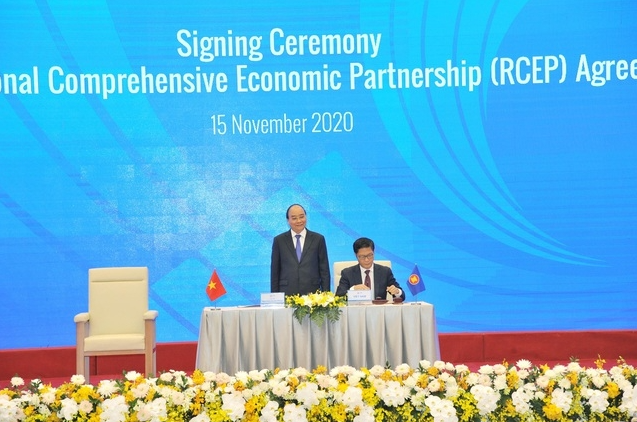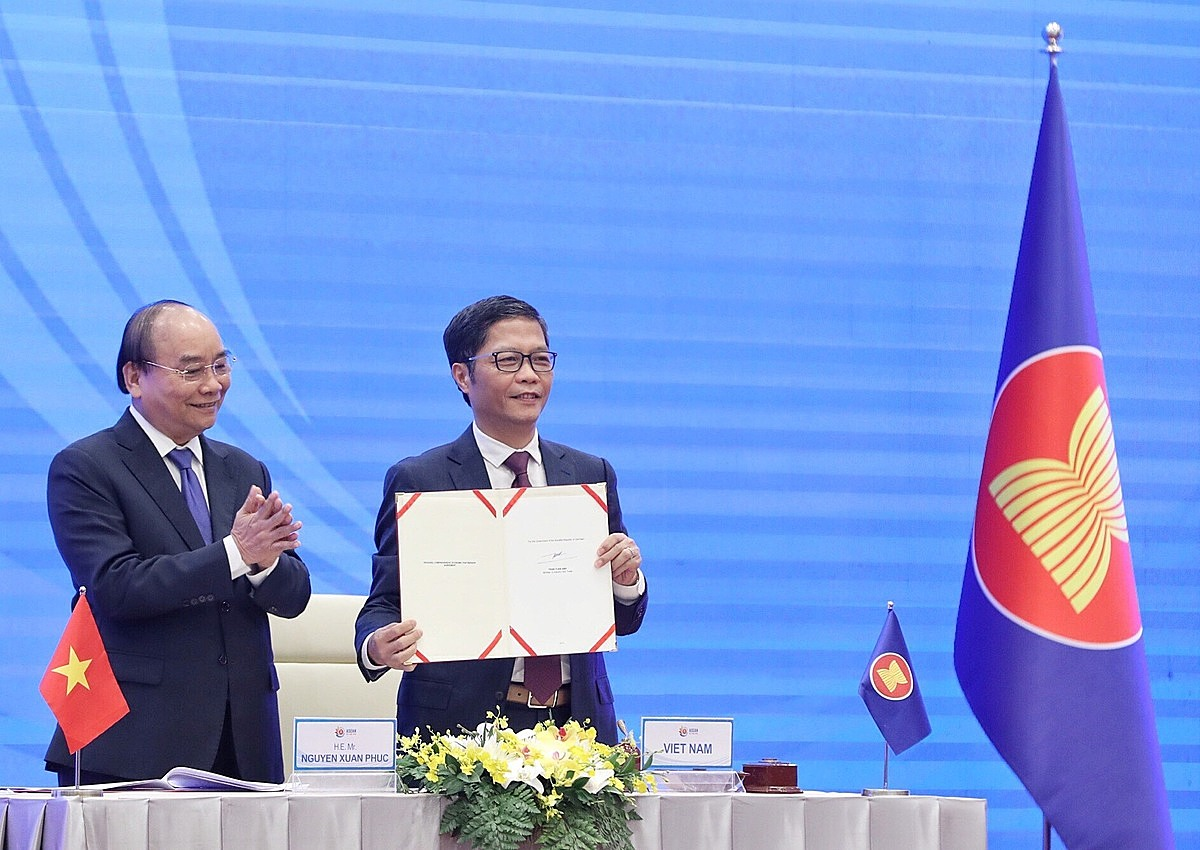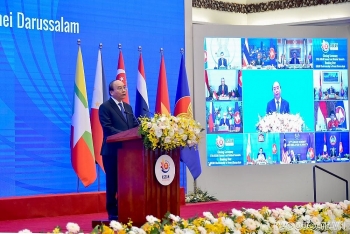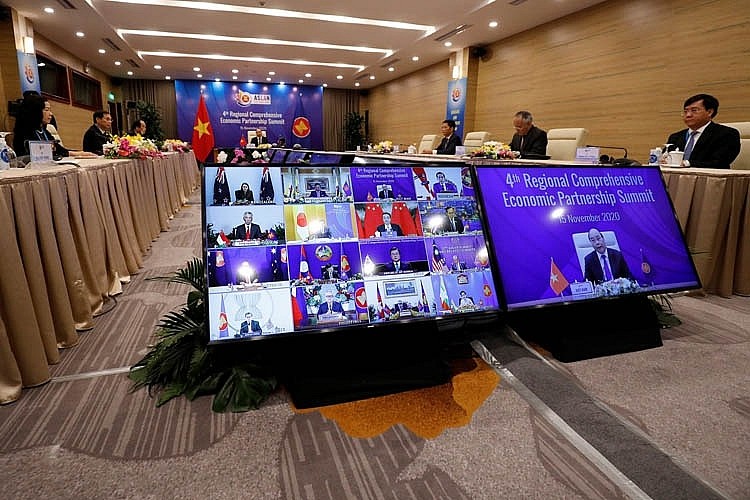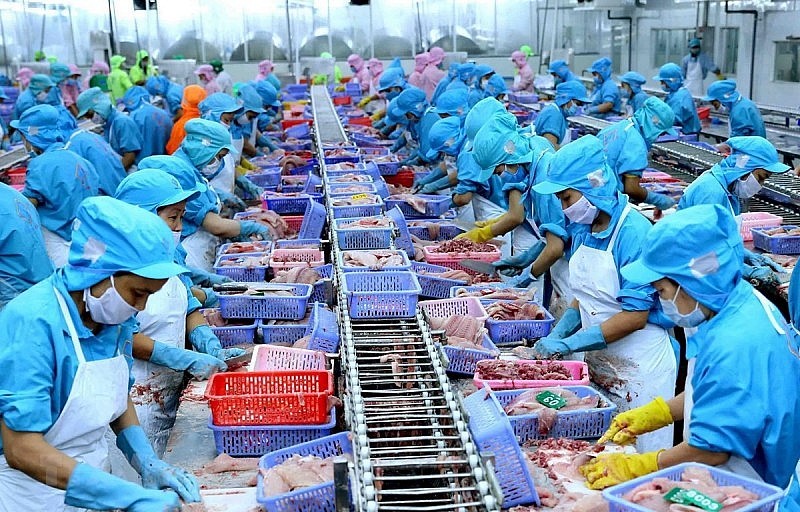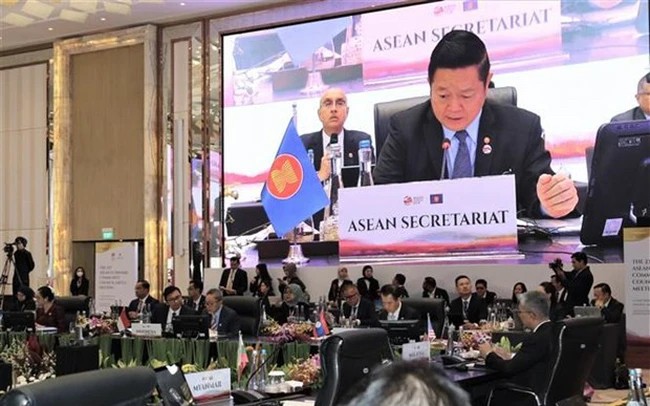China and 14 Asia-Pacific countries sign huge trade while U.S sits out
| How would RCEP move Vietnam's economy? | |
| RCEP Agreement: New opportunities, new challenges | |
| 37th ASEAN Summit and Related Summits successfully wrap up |
The Regional Comprehensive Economic Partnership spans 15 countries and 2.2 billion people, or nearly 30% of the world's population, according to a joint statement released by the nations on Sunday when the deal was signed. Their combined GDP totals roughly $26 trillion and they account for nearly 28% of global trade based on 2019 data, CNN reported.
The deal includes several of the region's heaviest economic hitters aside from China, including Japan and South Korea. New Zealand and Australia are also partners, as are Indonesia, Thailand, and Vietnam in Southeast Asia.
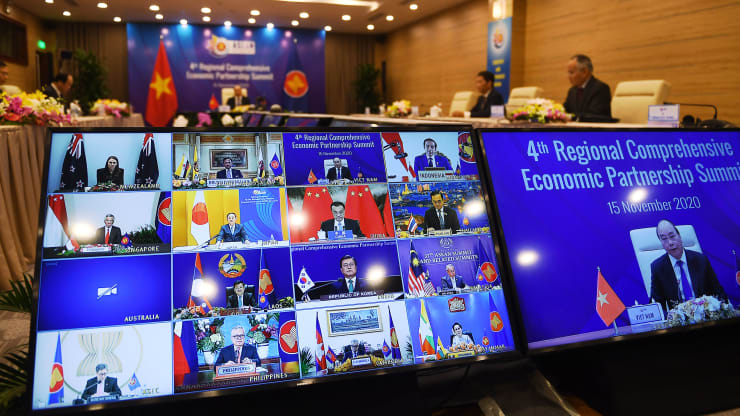 |
| Vietnam’s Prime Minister Nguyen Xuan Phuc is pictured on the screen (R) as he addresses his counterparts during the 4th Regional Comprehensive Economic Partnership (RCEP) Summit held online on Nov. 15, 2020. Photo: AFP |
The trade agreement was first proposed in 2012 as a way to create one of the world's largest free-trade zones.
It's tough to gauge the immediate economic significance of the deal. The members of the Association of Southeast Asian Nations — a group of 10 countries that signed the agreement — said that it would eliminate tariffs and quotas on 65% of the goods that are traded in the region.
The partner countries also noted the importance of the agreement as the world tries to recover from the coronavirus pandemic, saying in a joint statement that the deal "will play an important role in building the region's resilience through the inclusive and sustainable post-pandemic economic recovery process."
"Its symbolic value has always exceeded its actual value," said William Reinsch, a trade expert at the Center for Strategic and International Studies who served for 15 years as president of the National Foreign Trade Council. He pointed out that India opted out of the deal late last year, lessening the importance of the agreement in terms of the actual trade.
Reinsch said, though, that the agreement could have consequences in the long term, and added that China's involvement "is a sign of its willingness to play a constructive role, despite its aggressive actions in the South China Sea, Hong Kong, and elsewhere."
China and Australia, for example, have been caught up in trade disputes lately, but that hasn't stopped them from pressing ahead with the RCEP.
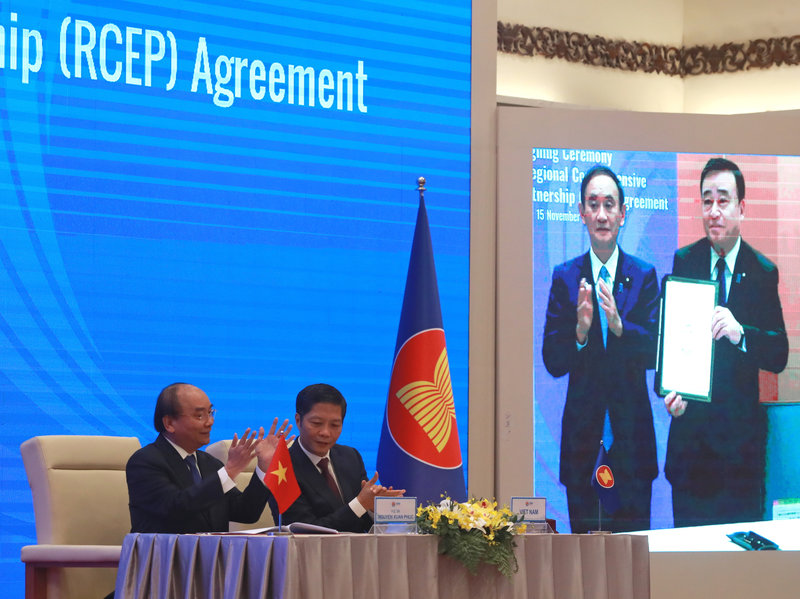 |
| Vietnamese Prime Minister Nguyen Xuan Phuc (left) and Trade Minister Tran Tuan Anh applaud next to a screen showing Japanese Prime Minister Yoshihide Suga and Trade Minister Hiroshi Kajiyama holding up signed RCEP agreement. Photo: AP |
"Both countries see huge benefits from their deeper economic integration with other Asian countries," said Murray Hiebert, senior associate of the Southeast Asia Program at CSIS. "The RCEP could potentially provide Beijing and Canberra another platform where they could discuss and hammer out their differences."
Others noted that the deal was further evidence of Asia's growing power. Economists at HSBC said Sunday that the agreement "signals that Asia keeps pushing ahead with trade liberalization even as other regions have become more skeptical."
"It may reinforce a trend that's been already underway for decades: that the global center of economic gravity keeps pushing relentlessly to the East," they wrote in a research note.
The U.S. may want to strike bilateral deals after being left out of the deal
Given its absence in the world’s largest trade agreement, the U.S. might want to “keep some of the doors open” with the participating Asia-Pacific countries by negotiating bilateral deals with them, an economist from HSBC said Tuesday.
“What the U.S. might do ... is strike more bilateral deals, bilateral agreements with individual RCEP members — not all of them but with some of them, just to keep some of the doors open,” Frederic Neumann, HSBC’s managing director and co-head of Asian economics research, told CNBC’s “Squawk Box Asia.”
Among members of RCEP, the U.S. only has bilateral trade deals with South Korea, Australia, and Singapore, according to the Department of State.
The TPP, negotiated by the Obama administration, would have allowed the U.S. greater engagement with the Asia-Pacific region.
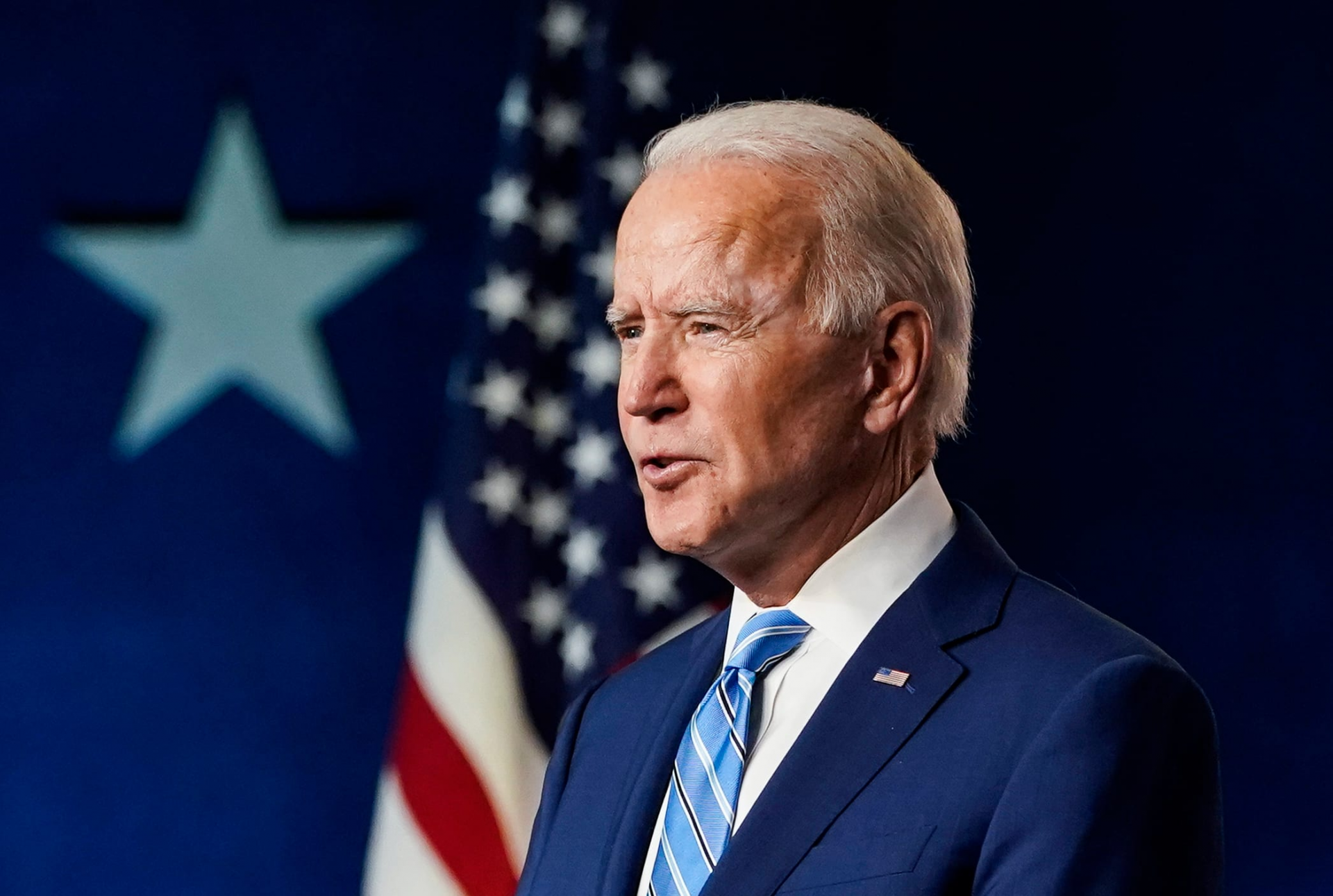 |
| President-elect Joe Biden Photo: CNBC |
President-elect Joe Biden, when asked on Monday whether the U.S. should join RCEP, said his country needs to be aligned with other democracies so that “we can set the rules of the road instead of having China and others dictate outcomes because they are the only game in town,” reported Nikkei Asia.
According to the report, he stopped short of committing to joining RCEP or the Comprehensive and Progressive Agreement for Trans-Pacific Partnership (CPTPP) — an updated version of the TPP that the remaining 11 countries renegotiated after the U.S. left unilaterally. But he reportedly said he has a “pretty thorough plan” to announce in January, reported Nikkei.
Like many experts, Neumann said there’s “overwhelming strategic arguments” why the U.S. should join the CPTPP, but domestic politics would make it difficult to do so.
“And the U.S. has its plate full right now, domestically,” he said, adding that the question of whether the U.S. would join CPTPP is one to be revisited in “maybe two years’ time.”
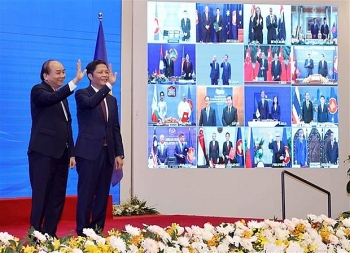 | World’s largest free trade agreement, covering 2.2 billion people signed by 15 countries The signing of the agreement will form the world’s largest free trade agreement, covering 2.2 billion people, or 30 percent of the world population, with ... |
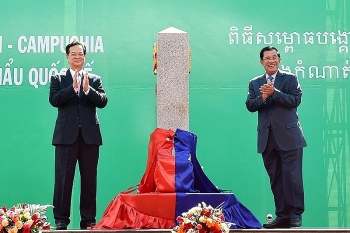 | Bu Prang: Differences In Perception About Border Delimitation Between Vietnam And Cambodia Vietnam and Cambodia have not yet agreed on the land border delimitation at 7 areas. |
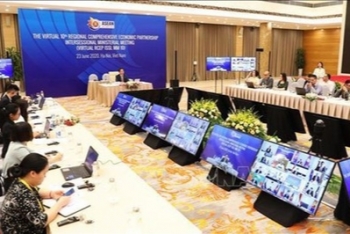 | Japanese scholar appreciated Vietnam's role in RCEP talks Professor Ryo Ikebe from the Senshu University of Japan has expressed his appreciation for the role that Vietnam plays in gathering voices of 10 ASEAN ... |
Recommended
 World
World
Pakistan NCRC report explores emerging child rights issues
 World
World
"India has right to defend herself against terror," says German Foreign Minister, endorses Op Sindoor
 World
World
‘We stand with India’: Japan, UAE back New Delhi over its global outreach against terror
 World
World
'Action Was Entirely Justifiable': Former US NSA John Bolton Backs India's Right After Pahalgam Attack
Popular article
 World
World
US, China Conclude Trade Talks with Positive Outcome
 World
World
Nifty, Sensex jumped more than 2% in opening as India-Pakistan tensions ease
 World
World
Easing of US-China Tariffs: Markets React Positively, Experts Remain Cautious
 World
World

